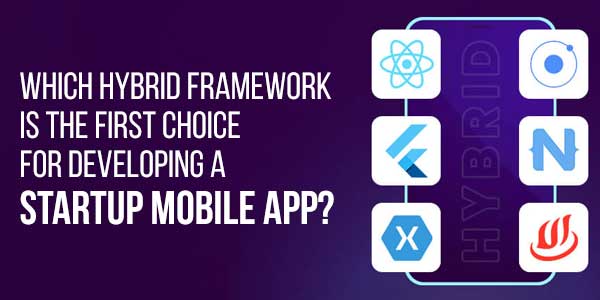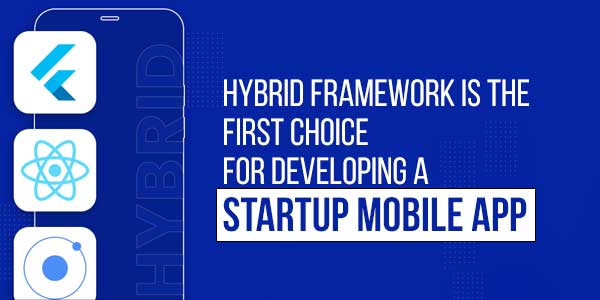
In today’s digital era, having a mobile app is crucial for the success and growth of startup businesses. However, when it comes to mobile app development, selecting the appropriate framework is of utmost importance. Hybrid frameworks offer a cost-effective and efficient solution for startups by enabling the creation of mobile apps that seamlessly function on multiple platforms. With numerous options available, it is vital to determine the best hybrid framework for startup mobile app development.
Table of Contents
Understanding Hybrid Frameworks:
Before exploring the top hybrid framework choices, it is essential to understand what a hybrid framework entails. A hybrid framework combines the capabilities of native app development and web app development. It allows developers to build mobile applications that can operate on different platforms, such as iOS and Android, using a single codebase.
The Advantages Of Hybrid Frameworks For Startups:
- Cost-effectiveness: Hybrid frameworks offer a more cost-effective option for startups as they eliminate the need for developing separate native apps for each platform. With a single codebase, development and maintenance costs are significantly reduced.
- Faster Development: Hybrid frameworks allow developers to write code once and deploy it on multiple platforms, speeding up the development process. This enables startups to bring their app to the market quickly.
- Easy Maintenance: By utilizing a shared codebase, updates or bug fixes can be implemented simultaneously across all platforms. This simplifies maintenance and allows startups to address issues promptly and efficiently.
- Wider Reach: Hybrid apps are compatible with multiple platforms, expanding the startup’s reach to a broader audience. This increases the chances of user acquisition and customer engagement.
- Access to Native Features: Hybrid frameworks provide access to native device features, such as camera, geolocation, and push notifications. Startups can leverage these features to enhance the functionality and user experience of their mobile app.
Popular Hybrid Frameworks For Startup Mobile App Development:
1.) React Native:
Developed by Facebook, React Native has gained immense popularity due to its performance and flexibility. It allows developers to build apps using JavaScript and provides access to native components. With a rich ecosystem and extensive community support, React Native is an excellent choice for startups aiming for cross-platform compatibility.
2.) Flutter:
Backed by Google, Flutter is another robust hybrid framework for startups. It uses the Dart programming language and enables the creation of visually appealing and highly performant mobile apps. Flutter’s hot reload feature facilitates real-time testing and quick iterations, making it ideal for startups looking for rapid development and experimentation.
3.) Ionic:
Built on Angular and Apache Cordova, Ionic is a popular hybrid framework that emphasizes creating visually compelling and feature-rich mobile apps. It offers a wide range of pre-built UI components, allowing startups to develop apps with a native-like look and feel. Ionic also seamlessly integrates with various plugins and APIs, enabling startups to incorporate desired functionalities effortlessly.
4.) Xamarin:
Owned by Microsoft, Xamarin is a robust hybrid framework that utilizes C# and .NET for app development. It offers a native-like user experience and performance by leveraging shared code across platforms. Xamarin’s integration with Visual Studio provides a seamless development experience, making it an ideal choice for startups familiar with Microsoft technologies.

Choosing The Best Hybrid Framework For Your Startup Mobile App:
The selection of the best hybrid framework for your startup mobile app depends on various factors, including your app’s requirements, target audience, and your development team’s expertise. Consider the following aspects when making your decision:
- Performance: Assess the performance capabilities of each framework and choose the one that aligns best with your app’s performance requirements. Factors such as rendering speed, user interface responsiveness, and battery consumption should be considered.
- Community Support: Research the size and engagement of the community behind each framework. A large and active community ensures continuous improvements, frequent updates, and readily available support resources.
- Third-Party Integration: Consider the ease of integrating third-party services and libraries with your chosen framework. Integration with services such as analytics, payment gateways, and social media can significantly enhance your app’s functionality and user experience.
- Learning Curve: Evaluate the learning curve associated with each framework, taking into account your development team’s skill set. Look for the availability of documentation, tutorials, and training resources to streamline the development process.
Conclusion:
Choosing the best hybrid framework for your startup mobile app development is crucial for the success of your venture. React Native, Flutter, Ionic, and Xamarin are all excellent options, each with its strengths and suitability for specific use cases. Evaluate your app requirements, conduct thorough research, and consider the guidelines mentioned to make an informed decision. Remember, the right hybrid framework choice will empower your startup to deliver a seamless, efficient, and accessible mobile app experience to your target audience.


















Be the first to write a comment.